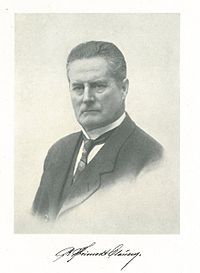Rudolf Frimodt Clausen was a Danish architect born in Copenhagen on 29 June 1861 to the bishop Johannes Clausen and grandson of the theologian Henrik Nicolai Clausen.[1][2]
Rudolf Frimodt Clausen | |
|---|---|
 | |
| Born | 29 June 1861 Copenhagen, Denmark |
| Died | 7 April 1950 (aged 88) Aarhus, Denmark |
| Nationality | Danish |
| Occupation | Architect |
Between 1886 and 1888 Frimodt Clausen worked as conductor for Vilhelm Theodor Walther. Later Frimodt Clausen worked a great deal in Aarhus as an architect. In 1891 he became architect for Aarhus Oliefabrik where he continued to work for the rest of his life. He designed the Ceres Brewery, the buildings in Guldsmedgade 1, 3, 5, 7 and 9, Store Torv 7 and the corner buildings on St. Paul's Church Square.[3]
In Frimodt Clausen's work can be seen inspiration from Anton Rosen in the early 1900s. Like other architects during this period he made buildings in both the National Romantic and Neoclassical style. He followed the architectural developments as can be seen in P.P. Ørumsgade where a city block was constructed in 1933-35 after designs by Frimodt Clausen in a Functionalist style.[3]
Frimodt Clausen died on 7 March 1950 in Aarhus.
Works
edit- Councillor Andersen's Foundation, Odder (1890)
- Christian IX's asylum, St. Poulsgade Århus (1891)
- Additions and renovations for Aarhus Oliefabrik (1891-1950)
- Bike factory Dania, Trøjborgvej, Aarhus (1896)
- Otto Mønsted's Margarine factory, Vestergade (1896-1910)
- Additions and renovations for the Ceres Brewery (1899-1930)
- St. Clemens Pharmacy, Studsgade 40, Aarhus (1900)
- St. Paul's Pharmacy, Jægergårdsvej 76, Aarhus (1900)
- Skade Rectory (1904)
- Marselisborg Boarding School (1904)
- Office and factory buildings for FDB, Aarhus (1905–07)
- Surgical department, Århus County Hospital (1906–08)
- Herning Hede- og Disconto Bank (1911)
- Medicinal Department, Århus Municipal Hospital (1911–20)
- Aarhus Oliefabrik, Port of Aarhus (1916–30)
- Grenå Hospital (1920–22)
- Silkeborg Court and Jail (1921–22)
- Jyllandsposten's Office and printing press building, Aarhus (1923–24)
- Addition and renovation, Silkeborg Hospital (1922–26)
- Skanderborg Hospital (1927–29)
- Ålborg County Hospital (1928–30)
- Building for De grønne pigespejdere, Aarhus (1928)
- Brobjerghus, Frederiksgade (1900)
References
edit- ^ "Ludvig A. Petersen" (in Danish). Aarhus City Archives. Archived from the original on 6 March 2016. Retrieved 23 February 2016.
- ^ "Arkitektur byggeskik byen" (in Danish). Aarhus Municipality. Archived from the original on 4 March 2016. Retrieved 23 February 2016.
- ^ a b "Rudolf Frimodt Clausen" (in Danish). Danish Ministry of Culture. Archived from the original on 3 March 2016. Retrieved 23 February 2016.